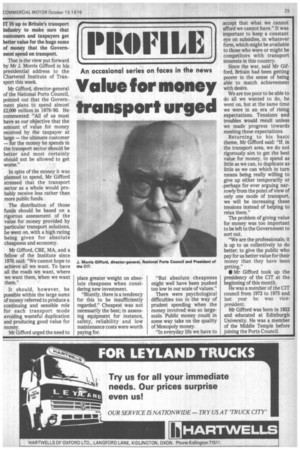PROFILE
Page 27

If you've noticed an error in this article please click here to report it so we can fix it.
An occasional series on faces in The news
Value for money transport urged
IT IS up to Britain's transport industry to make sure that customers and taxpayers get better value for the huge sums of money that the Government spend on transport.
That is the view put forward by Mr J. Morris Gifford in his presidential address to the Chartered Institute of Transport this week.
Mr Gifford, director-general of the National Ports Council, pointed out that the Government plans to spend almost £2,000 million in 1979/80. He commented: "All of us must have as our objective that the amount of value for money received by the taxpayer at large — the ultimate customer — for the money he spends in the transport sector should be better and most certainly should not be allowed to get worse."
In spite of the money it was planned to spend, Mr Gifford stressed that the transport sector as a whole would probably receive less rather than more public funds.
The distribution of those funds should be based on a rigorous assessment of the value for money provided by particular transport solutions, he went on, with a high rating being given for absolute cheapness and economy.
Mr Gifford, CBE, MA, and a fellow of the Institute since 1970, said: "We cannot hope to achieve all we want. To have all the roads we want, where we want them, when we want them."
It should, however, be possible within the large sums of money referred to produce a continuing and sensible role for each transport mode avoiding wasteful duplication and producing good value for money.
Mr Gifford urged the need to place greater weight on absolute cheapness when considering new investment.
"Bluntly, there is a tendency for this to be insufficiently regarded." Cheapest was not necessarily the best; in assessing equipment for instance, safety, reliability and low maintenance costs were worth paying for. "But absolute cheapness might well have been pushed too low in our scale of values."
There were psychological difficulties too in the way of prudent spending when the money involved was so largescale. Public money could in some way take on the quality of Monopoly money.
"In everyday life we have to accept that what we cannot afford we cannot have." It was important to keep a constant eye on subsidies, in whatever form, which might be available to those who were or might be competitors with transport interests in this country.
Since the war, said Mr Gifford, Britain had been getting poorer in the sense of being able to match achievement with desire.
We are too poor to be able to do all we wanted to do, he went on, but at the same time we were in an era of rising expectations. Tensions and troubles would result unless we made progress towards meeting these expectations.
Returning to his basic theme, Mr Gifford said: "If, in the transport area, we do not rigorously aim to get the best value for money, to spend as little as we can, to duplicate as little as we can which in turn means being really willing to give up either temporarily or perhaps for ever arguing narrowly from the point of view of only one mode of transport, we will be increasing these tensions instead of helping to relax them."
The problem of giving value for money was too important to be left to the Government to sort out.
"We are the professionals; it is up to us collectively to do better; to give the public who pay for us better value for their money than they have been getting."
• Mr Gifford took up the presidency of the CIT at the beginning of this month.
He was a member of the CIT council from 1972 to 1975 and last year he was vicepresident.
Mr Gifford was born in 1922 and educated at Edinburgh University. He was a member of the Middle Temple before joining the Ports Council.






















































































































